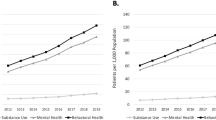Abstract
This study assessed the impact of the Integrated Care Program (ICP), a new Medicaid managed care model in Illinois, on health services utilization and costs for adults with behavioral health conditions. Data sources included Medicaid claims, encounter records, and state payment data for 28,127 persons with a behavioral health diagnosis. Difference-in-differences models, in conjunction with propensity score weighting, were used to compare utilization and costs between ICP enrollees and a fee-for-service (FFS) comparison group. The model considered the impact of the SMART Act, which restricted access to care for the comparison group. Before the SMART Act, ICP was associated with 2.8 fewer all-cause primary care visits, 34.6 fewer behavioral health-specific outpatient visits, and 2.5 fewer all-cause inpatient admissions per 100 persons per month, and $228 lower total costs per member per month relative to the FFS group. After the SMART Act, ICP enrollees had increased outpatient and dental services utilization without significantly higher costs. The relative increase in utilization was due primarily to decreased utilization in the restricted FFS group after the SMART Act. By the end of the study period, the ICP group had 13.3 more all-cause primary care visits, 1.5 more emergency department visits, and 1.4 more dental visits per 100 persons per month relative to the FFS program. A fully-capitated, integrated managed care program has the potential to reduce overall Medicaid costs for people with behavioral health conditions without negative effects on service utilization.


Similar content being viewed by others
References
Austin, P. C., & Stuart, E. A. (2015). Moving towards best practice when using inverse probability of treatment weighting (IPTW) using the propensity score to estimate causal treatment effects in observational studies. Statistics in Medicine, 34(28), 3661–3679.
Bianconi, J. M., Mahler, J. M., & McFarland, B. H. (2006). Outcomes for rural Medicaid clients with severe mental illness in fee for service versus managed care. Administration and Policy in Mental Health, 33(4), 411–422.
Bindman, A. B., Chattopadhyay, A., Osmond, D., Huen, W., & Bacchetti, P. (2004). Preventing unnecessary hospitalizations in Medi-Cal: Comparing fee-for-service with managed care. California HealthCare Foundation. Retrieved from http://www.chcf.org/~/media/MEDIA%20LIBRARY%20Files/PDF/PDF%20P/PDF%20PreventableHospitalizationsInMediCal.pdf.
Bouchery, E., & Harwood, H. (2003). The Nebraska Medicaid managed behavioral health care initiative: Impacts on utilization, expenditures, and quality of care for mental health. The Journal of Behavioral Health Services & Research, 30(1), 93–108.
Callahan, J. J., Shepard, D. S., Beinecke, R. H., Larson, M. J., & Cavanaugh, D. (1995). Mental health/substance abuse treatment in managed care: The Massachusetts Medicaid experience. Health Affairs (Millwood), 14(3), 173–184.
Clark, R. E., Leung, Y. H., Lin, W., Little, F. C., O’Connell, E., O’Connor, D. M., … Browne, M. K. (2009). Twelve-month diagnosed prevalence of mental illness, substance use disorders, and medical comorbidity in Massachusetts Medicare and Medicaid members aged 55 and over. Clinical & Population Health Research. Retrieved from http://escholarship.umassmed.edu/gsbs_cphr/26.
Department of Health & Human Services, Centers for Medicare & Medicaid Services. (2011). CMS Manual System. Pub 100-04 Medicare Claims Processing. Retrieved from https://www.cms.gov/Regulations-and-Guidance/Guidance/Transmittals/downloads/R2161CP.pdf.
Duggan, M., & Hayford, T. (2013). Has the shift to managed care reduced Medicaid expenditures? Evidence from state and local-level mandates. Journal of Policy Analysis and Management, 32(3), 505–535.
Gifford, K., Ellis, E., Edwards, B., Associates, A. LashbrookH. Management, Hinton, E., Antonisse, L., & Valentine, A. & Robin Rudowitz Kaiser Family Foundation (2017). Medicaid moving ahead in uncertain times: Resuls from a 50-state Medicaid Budget Survey for State Fiscal Years 2017 and 2018. Available at http://files.kff.org/attachment/Report-Results-from-a-50-State-Medicaid-Budget-Survey-for-State-Fiscal-Years-2017-and-2018. Accessed August 10, 2018.
Heller, T., Owen, R., Mitchell, D., Eisenberg, Y., Wing, C., Bowers, A., … Viola, J. (2015). An independent evaluation of the integrated care program: Final report findings through the third year (FY14). Institute on Disability and Human Development, University of Illinois at Chicago. Retrieved from http://www.cbha.net/Resources/Documents/ICP%20Final%202015%20Report%20-%20August%202015.pdf.
Hutchinson, A. B., & Foster, E. M. (2003). The effect of Medicaid managed care on mental health care for children: A review of the literature. Mental Health Services Research, 5(1), 39–54.
Jones, K., Huey, J. C., Jordan, N., Boothroyd, R. A., Ramoni-Perazzi, J., & Shern, D. L. (2006). Examination of the effects of financial risk on the formal treatment costs for a Medicaid population with psychiatric disabilities. Medical Care, 44(4), 320–327.
Kronick, R., & Welch, W. P. (2014). Measuring coding intensity in the Medicare Advantage program. Medicare & Medicaid Research Review. Retrieved from https://www.cms.gov/mmrr/downloads/mmrr2014_004_02_a06.pdf.
Kronick, R. G., Bella, M., & Gilmer, T. P. (2009). The faces of Medicaid III: Refining the portrait of people with multiple chronic conditions. Retrieved from http://www.chcs.org/media/Faces_of_Medicaid_III.pdf.
Leff, H. S., Wieman, D. A., McFarland, B. H., Morrissey, J. P., Rothbard, A., Shern, D. L., … Allen, I. E. (2005). Assessment of Medicaid managed behavioral health care for persons with serious mental illness. Psychiatric Services, 56(10), 1245–1253.
Lewis, C., Lynch, H., & Johnston, B. (2003). Dental complaints in emergency departments: a national perspective. Annals of Emergency Medicine, 42(1), 93–99.
Marton, J., Yelowitz, A., & Talbert, J. C. (2014). A tale of two cities? The heterogeneous impact of Medicaid managed care. Journal of Health Economics, 36, 47–68.
Masland, M. C., Snowden, L. R., & Wallace, N. T. (2007). Assessment, authorization and access to medicaid managed mental health care. Administrationa and Policy in Mental Health, 34(6), 548–562.
National Committee for Quality Assurance. (2015). Mental health utilization: Number and percentage of members receiving the following mental health services during the measurement year: Any service, inpatient, intensive outpatient or partial hospitalization, and outpatient or ED. Retrieved from https://www.qualitymeasures.ahrq.gov/summaries/summary/49826.
Owen, R., Heller, T., & Bowers, A. (2016). Health services appraisal and the transition to Medicaid Managed Care from fee for service. Disability and Health Journal, 9(2), 239–247.
Quan, H., Sundararajan, V., Halfon, P., Fong, A., Burnand, B., Luthe, J., … Ghali, W. A. (2005). Coding algorithms for defining comorbidities in ICD-9-CM and ICD-10 administrative data. Medical Care, 43(11), 1130–1139.
Satcher, D. S. (2000). Surgeon General’s report on oral health. Public Health Reports, 115(5), 489–490.
Smith, V. K., Gifford, K., Ellis, E., Edwards, B., Rudowitz, R., Hinton, E., … Valentine, A. (2016). Implementing coverage and payment initiatives: Results from a 50-state Medicaid budget survey for state fiscal years 2016 and 2017. Retrieved from http://www.kff.org/medicaid/report/implementing-coverage-and-payment-initiatives-results-from-a-50-state-medicaid-budget-survey-for-state-fiscal-years-2016-and-2017.
Sturm, R. (1999). Cost and quality trends under managed care: Is there a learning curve in behavioral health carve-out plans? Journal of Health Economics, 18(5), 593–604.
The Lewin Group. (2009). Medicaid Managed Care cost savings—A synthesis of 24 studies. Working Paper 17236. Retrieved from http://blogs.chicagotribune.com/files/lewinmedicaid.pdf.
Wooldridge, J. M. (2013). Introductory econometrics: A modern approach (5th ed.). Cincinnati: Southwestern College Publishing.
Funding
This research was funded by the following sources: National Institutes of Health, grant# R24 P2CHD065702, and K01HD086290; and National Institute on Disability, Independent Living, and Rehabilitation Research (NIDILRR), Grant # 90AR5019, #90RT5023-01-00, #90RT5020-01-00, and #90RT5026-01-00.
Author information
Authors and Affiliations
Corresponding author
Ethics declarations
Conflict of interest
The authors declare no conflicts of interest.
Ethical Approval
All procedures performed in studies involving human participants were in accordance with the ethical standards of the institutional and/or national research committee and with 1964 Helsinki declaration and its later amendments or comparable ethical standards.
Electronic supplementary material
Below is the link to the electronic supplementary material.
Rights and permissions
About this article
Cite this article
Xiang, X., Owen, R., Langi, F.L.F.G. et al. Impacts of an Integrated Medicaid Managed Care Program for Adults with Behavioral Health Conditions: The Experience of Illinois. Adm Policy Ment Health 46, 44–53 (2019). https://doi.org/10.1007/s10488-018-0892-8
Published:
Issue Date:
DOI: https://doi.org/10.1007/s10488-018-0892-8



